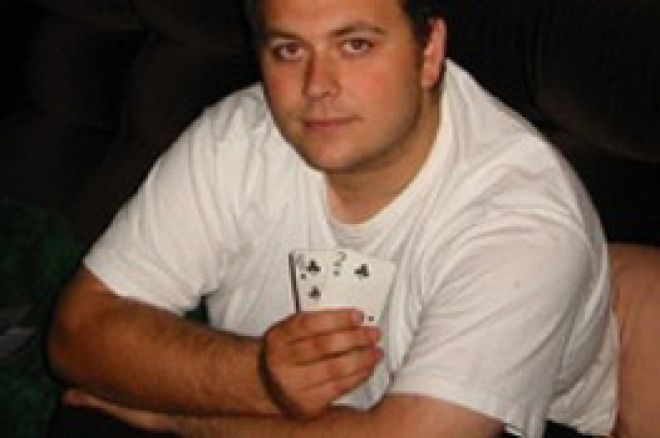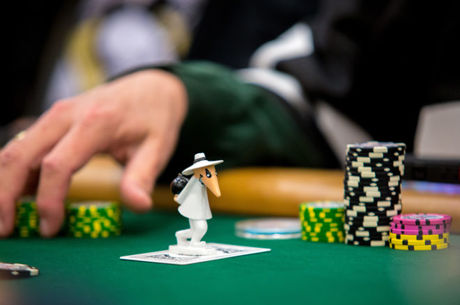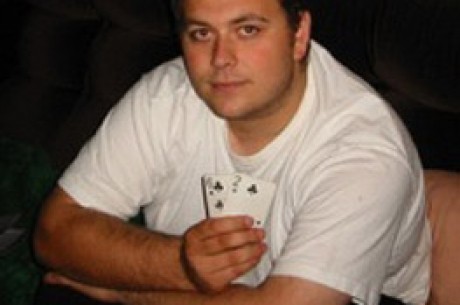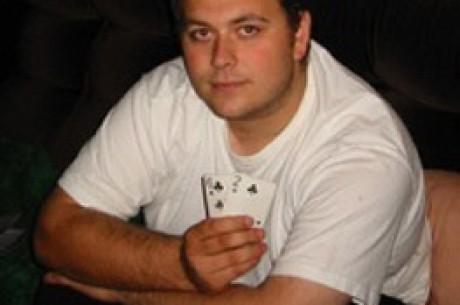Surrendering the Pot with a Good Starting Hand

One of the most difficult areas in poker strategy is the big laydown. When you are playing seven card stud, you may have aces up concealed and your opponent has 7-9-J showing. If your opponent has trips or Q-10 in this situation, it is very difficult to laydown your hand. But in holdem the community card nature of the game takes some of the difficulty out of this task and laydowns can be easier to make.
Unfortunately, most players simply refuse to let go of their hand. This usually happens for two reasons. First, most players concentrate too much on their own cards. If you have AsAc and the board is Kd-Kh-Qh-Jh-9h and there is betting and raising on the river, your aces are clearly no good. But many players look at their starting cards and think "aces ? I must call" rather than asking "can my opponent beat a pair of aces in this hand?" Second, they are on tilt (be it a little or a lot). A player who has lost two big pots to draws may decide "I'm not going to let them run over me every time a scare card drops....I'm calling all the way to the river." This is tilt rationalization. And don't worry - we've all been there. Controlling tilt is a topic for another time. I want to discuss big laydowns and I believe there are two cues you should look out for when deciding to make a big laydown.
The board is too dangerous
This is the most obvious reason. I believe you should apply common sense to a lot of these situations. Consider the example above: two black aces on a board of K-K-Q-J-9 with four hearts on the board. If there is even a single bet, I would strongly consider folding. I say almost because there are a very small minority of players who routinely bet a river when the board is dangerous. In this case, I may consider (stress "consider") paying off a single bet. But a decision to call in this situation would be based more on a 'tell' or an instinct/impression. Generally, I would lean towards folding.
If, in the same situation, there is more than one opponent in the pot and there is a bet and call in front of me, my cards would be mucked without hesitation. Have I ever got it wrong? Absolutely. How many times am I correct in folding my cards in this situation: maybe 95% of the time. If you can find a decision that is correct even 80% of the time in poker, you will make/save a large amount of money on that decision in the long run.
As you gain more experience, your judgment sharpens to the point where you will laydown hands like a small flush where the board is 2h-7h-10c-Qs-5h. Here, a flush looks good, but if one opponent bets and another raises on the river, I'm usually out. It would seem that one has a flush better than mine as most players don't risk raising the river when a flush card falls. However, this goes to show you that a big laydown does not necessarily require an overly dangerous board.
When your opponent knows what you have
Let's say I raise before the flop from an early position with KK and two players call. If the flop came 8-9-10, I would bet. If a player then raised me, I would go ahead and reraise to define my hand and kick out the third opponent. If my opponent reraises, jump to the third level of psychology in poker: what does my opponent put me on? I am fairly selective in my starting cards and if I raise from an early position, I've usually got a strong hand. If I bet out on the flop, my opponent raises and I reraise, my opponent is fairly certain now that I don't have AK. I have a pocket pair higher than the board.
If he calls, he is evidently concerned that I have a hand like KK or AA and cannot beat that. If he reraises me again on the flop, it would appear that he knows I have AA or KK, but is not concerned because his can beat that.
If he calls the flop, the turn is a rag. I'll go ahead and bet. If he then raises, I will consider folding for the same reasons as mentioned above: he must put you on AA or KK or something like that. In a nutshell, if your opponent is likely to put you on the hand that you have, but raises you, it seems pretty obvious that a big laydown may be necessary. The exception would be an extremely tough game, where you would consider calling, closing your eyes and praying.
The above situation can apply when the board is relative innocuous. I just used a slightly more dangerous board to demonstrate. I recall one laydown I made with pocket aces when the board was something like J-9-3-4. I raised before the flop and bet on the flop. I was called by two players, one of which was very timid: he checked a lot of strong hands instead of betting. On the turn, the first opponent came out betting and then the timid player raised. My cards were folded straight away. As you may have guessed, the timid player had pocket jacks. The other player had 9-4 and no outs. So I suppose he got what he deserved for chasing with trashy cards. In any case, the laydown on the turn appeared correct given the type of player and the fact that he must give me credit for a big hand.
As a side note, I find big laydowns are difficult to make in online poker. The fact that I am not sitting across from my opponent makes it more difficult to work out. You have to rely on betting patterns and the style of their game a lot more. But because online players move in and out of the game very quickly, it is difficult to keep track of each player's game plan and you have to do a lot more guessing....and calling!








